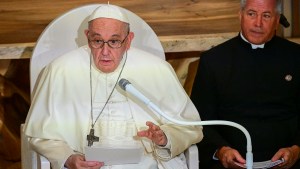A Mass of Reconciliation celebrated by the pope on July 28, 2022, at the breathtaking Sainte-Anne-de-Beaupré sanctuary in Quebec was focused on the suffering of the various Indigenous Peoples.
Some 70% of the seats were reserved for their organizations. They shared with I.Media both their wounds and their high expectations of the Church and the pope.
In a context marked by the suffering of these peoples, at the beginning of the celebration attended by some 5,000 people, a group held up a banner in the central aisle on which was written in English: “Rescind the doctrine.”
This silent protest — which did not disrupt the Mass — referred to the “doctrine of discovery,” established by the bull Romanus Pontifex of Pope Nicholas V in 1455. Many indigenous people are asking the pope to formally revoke this document, which spoke to Christian monarchs taking possession of non-Christian lands.
“Church officials did not renounce the Doctrine of Discovery, they did not revoke the papal bulls that did so much harm to the natives,” lamented Vaughn Nicholas, a member of the Wolostoq First Nation and a survivor of residential schools, who was present in the pews of the shrine.
“We all want reconciliation, but reconciliation cannot happen until the truth is told,” he said. “The church needs to be aware of what happened to Indigenous peoples, not just in residential schools but before that, it needs to be aware of the impact of its doctrine.”
For Vaughn Nicholas, a healing process “will take time.”
“I was in residential schools for six years; it’s not easy to forgive for what was done to us there, it will stay with us for our whole lives. We were not treated as humans by the Church. When they came to my homeland, to the reserves, they told us that we spoke ‘the devil’s language.’ They converted many of our people by force. What happened was genocide.”
Clearly moved by the recollection of his past, Vaughn Nicholas recalled himself as an “innocent, barefoot little boy.”
“I played, I explored everywhere with my cousins, we spoke the language of our community. I would help my grandmother tie bait on the fishing rods, we didn’t have running water but pure river water. We had freedom, laughter. For me, it was a happy time, it was heaven.”
“After that,” he narrated, “I was taken to residential school with my sister Iris and brother Wayne in 1955. I had not experienced physical abuse before. We were bullied, and when we spoke words in our language in the midst of English we were punished. I was afraid of those big buildings … for me it was hell. Not just for me, but for all the kids who went there before and after.”
“You can’t blame the whole Catholic Church”
Some Indigenous organizations have criticized the pontiff for not apologizing for the Church as an institution, but for placing the blame on the individual religious who ran residential schools.
Elmer St. Pierre, national chief of the Congress of First Peoples, distanced himself from that criticism. “Since the beginning of the trip, the pope has asked for forgiveness, he did it in Edmonton, in Quebec City,” he said. “It is not the Catholic Church that has been the cause of all this, it is our government in Canada.”
Elmer St. Pierre repeats with conviction: “The Church did not decide to take away the heritage of the Indigenous people, their language, to cut their hair, to make them white children. Priests, nuns, acted, but if the government had not organized this, it would never have happened. It was the government that came to the villages and took the children away.”
Anne Coulter, from the diocese of Valleyfield, west of Montreal, left by bus at 2 a.m. to come “to help with reconciliation.”
“I know there is a lot of controversy around the Pope’s words, but I think it’s normal for him to apologize for the people who acted. You can’t blame the whole Catholic Church, but the people who were in the residential schools,” she said.
Aware of the high expectations, Anne Coulter expressed some skepticism about the celebration: “I don’t know if a Mass is what the Natives need. Maybe we should have had a purification celebration, according to their customs, with the pope present.”


